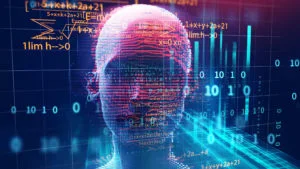Artificial intelligence and the future of cybersecurity

Posted on February 4, 2020 by Samantha Baidoo
Both artificial intelligence (AI) technology and cybersecurity have had a large impact on organisations in recent years. Shaping the way in which data is managed and impacting how effectively cybersecurity threats are responded to. It is predicted that there will be an increase in the next few years in the involvement of machine learning and integration with AI. Organisations will need to be able to adapt to accommodate this and to understand the future of AI and how it can reduce the threat of cybercrime.
How can AI reduce cybercrime?
In the business environment, AI is currently being used to analyse large amounts of data and to help streamline processes, it is also increasingly being used as a method of cybersecurity protection by alerting organisations of unusual activity. AI and machine learning tools help reduce cybercrime in a variety of ways, from automatic network security monitoring to behavioural analytics, vulnerability management or Phishing detection.
Behavioural analytics AI tracks a user’s patterns, for example, what time you generally log in and log off, what IP addresses you tend to use and then algorithms notice unusual activity and flag it for further investigation. AI-based systems proactively look for potential vulnerabilities in organisational information systems to determine when and how an organisation might be attacked. With Phishing detection AI can detect and track more than 10,000 active phishing sources reacting much faster than a human could, AI can also differentiate between a fake website and a legitimate one quickly.

Are there any drawbacks to AI and cybersecurity?
Unfortunately, AI isn’t going to solve all your cybersecurity worries. AI is a machine process, so when faced with cybersecurity threats it is not able to improvise in the same way as a human. Meaning its algorithms can be deceived. Organisations should not rely solely on AI for their cybersecurity solution, there should also be a focus on training and awareness of users.
AI and skills gaps
The adoption of AI and automation tech in the UK is not as rapid as it could be due to a skills gap in the workforce, organisations do not always have the right talent to implement AI or handle the automation processes. Choosing the right AI tools where employees do not need a degree in data science to understand and operate them will help reduce the impact of the skills gap or providing additional training for employees can help mitigate this.
AI and Machine learning cyber attacks
As much as AI helps organisations to recognise cybercrime it also, unfortunately, helps cybercriminals, hackers are also able to use AI to hack into systems and test and enhance their malware. There are many pieces of information that can be accessed about your organisation, clients and employees with the use of AI and this can include passwords, credit card information and much more. Hackers using AI can implement faster attacks on a large scale with inevitably greater consequences.
For more information on cybersecurity and AI contact us at [email protected] or call us on 01483 412 042







